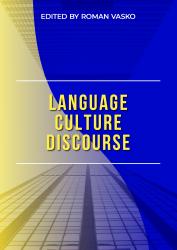Сoncept of engl. Courage / ukr. Хоробрість as stereotype of ethnocultural mentality of Ukrainians and English
Keywords:
ethnic stereotype, cultural idea, national world view, idiomatic nomination, linguistic reconstructionSynopsis
The chapter offers a multidisciplinary approach to the reconstruction of ethnic and cultural stereotypes which has provided the insight into their cultural, symbolic and linguistic contents. To analyse idiomatic ethnic and cultural idea of the Ukrainians and English about the concept of COURAGE the reconstructed etymons have been suggested. The cultural and semantic connections of these etymons to idiomatic nominations of ethnocultural stereotypes of the Ukrainians and English have been established. Ethnocultural stereotypes are the part of national language worldview. The techniques developed in cultural semiotics, cognitive onomasiology, frame semantics and idiomatic semiotics have been involved. It has been stated that in the English language, COURAGE is stereotyped in idioms with the man component – man as a real example of human will and power. A courageous man is stereotyped in the minds of Ukrainians as an ideal example. COURAGE is the basis of the chivalry of the English that is formed in the minds of native English speakers as the uniqueness of the Nordic character trait. Ukrainians formed a chivalry-Cossack type of man, adherent to the ideal of defence, honour, will and faith, defending their native land.
References
Lippman, W. (1950). Public Opinion. Macmillan.
Bartminski, J. (2012). Aspects of Cognitive Ethnolinguistics. Equinox, 256.
Tcivian, T. V. (2009). Model mira i ee lingvisticheskie osnovy. Moscow: Librokom, 278.
Grigoryev, D., Fiske, S. T., Batkhina, A. (2019). Mapping Ethnic Stereotypes and Their Antecedents in Russia: The Stereotype Content Model. Frontiers in Psychology, 10. doi: https://doi.org/10.3389/fpsyg.2019.01643
Shutova, M., Mudrynych, S. (2020). The Concept of "New Life" as a Powerful Psycholinguistic Element in the Inaugural Addresses of the U.S. Presidents. Revista Amazonia Investiga, 9 (33), 8–16. doi: https://doi.org/10.34069/ai/2020.33.09.1
Croizet, J. C. (2001). Stereotype Threat, Social Class, Gender, and Academic Under-Achievement: When Our Reputation Catches Up to Us and Takes Over. Social Psycology of Education, 4 (3), 295–310. doi: https://doi.org/10.1023/A:1011336821053
Schmalor, A., Cheung, B. Y., Heine, S. J. (2021). Exploring people's thoughts about the causes of ethnic stereotypes. PLOS ONE, 16 (1), e0245517. doi: https://doi.org/10.1371/journal.pone.0245517
Apresian, Iu. D. (1995). Izbrannye trudy. Shkola "Iazyki russkoi kultury".
Hnapovska, L. V. (2011). Tekst imeni v teksti kultury: antroponimichni etiudy. Naukovyi visnyk kafedry YuNESKO KNLU. Seriia Filolohiia. Pedahohika. Psykholohiia, 22, 10–19.
Mikes, G. (1946/1973). How to Be an Alien. A Handbook for Beginners and More Advanced Pupils. Wingate. Available at: http://f2.org/humour/howalien.html
Klein's Comprehensive Etymological Dictionary of the English Language. (1966). Elsevier publishing company, 844.
Wierzbicka, A. (1991). Cross-Cultural Pragmatics: The Semantics of Human Interaction. Mouton de Gruyter. doi: https://doi.org/10.1515/9783112329764
Orwell, G. (1947) The English People. Collins.
Clark, J. C. D. (2000). Protestantism, Nationalism, and National Identity, 1660–1832. The Historical Journal, 43 (1), 249–276. doi: https://doi.org/10.1017/s0018246x99008997
Wolf, F. (2001). The Emergence of National Identity in Early Modern England. Causes and Ideological Representations. Writing the Early Modern English Nation. Brill, 149–172. doi: https://doi.org/10.1163/9789004489332_009
Karasik, V. I. (2000). O tipakh diskursa. Iazykovaia lichnost: institutcionalnyi i personalnyi diskurs. Volgograd: Peremena, 5–20.
Fox, K. (2004). Watching the English. The Hidden Rules of English Behaviour. Hodder and Soughton Ltd.
Cowie, A. P., Mackin, R., McCaig, I. R. (1996). ODEI – Oxford Dictionary of English Idioms. Oxford University Press.
Zindler, F. R. Spirit, Soul and Mind. Available at: http://www.positief-atheisme.nl/atheisten/frank_r_zindler/spirit_soul_and_mind.html
Chyzhevskyi, D. (1992). Narysy z istorii filosofii na Ukraini. Kyiv: Orii, 230.
Bilonozhenko, V. (1993). Frazeolohichnyi slovnyk ukrainskoi movy. Naukova dumka, 980.
Longman Dictionary of Contemporary English (2014). Pearson, 493.
Harper, D. Online Etymology Dictionary. Available at: http://www.etymonline.com/
Bilodid, I., Kolomiiets V. (1982–2012). Etymolohichnyi slovnyk ukrainskoi movy. Kyiv: Naukova dumka.
Machek, V. (1957). Etymologický slovník jazyka českého a slovenského. Čsav, 865.
Chambers Dictionary of Idioms (1996). Chambers.
Nomys, M. (2004). Ukrainski prykazky, prysliv'ia, i take inshe. Kyiv: Lybid, 352.
Kulchytskyi, O. (1995). Osnovy filosofii i filosofichnykh nauk. Lviv: Ukrainskyi vilnyi universytet.









